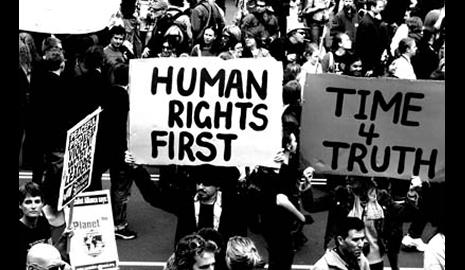






To defend human rights.
To wake up and organize against mining companies, gender-based discrimination, and government-imposed censorship; to mobilize resistance for the right to love who you choose and in defense of land and ancestral heritage and face constant threats and physical harm; to be labeled an enemy of the state in attempts to ensure access to water, sanitation, shelter, and other basic human needs; to witness family and colleagues across the region fall one by one in their fight to defend the rights so few have access to, yet so many take for granted.
To defend: a task that seems Sisyphean at best and deadly, at worst.
In 2018, the year in which we celebrate the 20th anniversary of the Declaration on Human Rights Defenders, to work as a human rights defender in Latin America means to navigate a turbulent sea without the guarantee of State protection or accountability while carrying the pain and concerns of thousands whose rights have gone unprotected.
Beneath the waves, a rip tide so many of us read about, day in and day out: Since the signing of the peace agreements in 2016, 331 human rights defenders in Colombia have been taken away from us. In Honduras, 123 defenders have died since the coup in 2009, of those 33 were killed after Berta Caceres’ death in 2016 in retaliation for their work protecting the environment from extractive industries. In Nicaragua, over 300 people have been killed in anti-government protests. Moreover, as reported during a regional consultation in Lima with the UN Special Rapporteur on the situation of human rights defenders Michel Forst, the patterns of violence and impunity faced by activists in Paraguay, Chile, Ecuador, and Peru mirror those of countries where violence against human rights defenders is currently more internationally recognized, such as Colombia and Honduras.
Given these statistics, it is clear that social leaders in Latin America are caught within a regional crisis. It is undeniable that attacks against human rights defenders weaken the foundation of democracies- especially those that occur in already fragile States.
Yet it is unfortunate that the high death toll of human rights defenders is becoming a reported norm that leaves limited room to celebrate the important victories they have achieved for their communities.
In Argentina, for example, the Senate came closer than ever before to legalizing abortion for pregnancies up to 14 weeks. The Ni Una Menos movement, which kicked off in 2015 to put violence against women on the map in predominantly catholic Argentina was, in large part, responsible for this success.
In Costa Rica, the Inter-American Court on Human rights issued a landmark consultative opinion at the beginning of the year that clarified the obligations of States across Latin America under the American Convention on Human Rights with regard to transgender and marriage rights of same-sex couples. The support and pressure of LGBTQI activists was essential to raise awareness on the need to develop a consolidated regional framework on transgender and same-sex marriage rights.
Finally, at a time when impunity for crimes against defenders is frequently the norm, the trial against those accused for Berta Caceres’ murder is slated to start in September before the Honduran court system. This was only possible thanks to the relentless pursuit for justice by members of the COPINH, the Lenca community, and international human rights and environmental groups.
On the 20th anniversary of the Declaration of Human Rights Defenders, we should mourn those that were taken from us but we should never forget to celebrate the movements they inspired against all odds. Understanding their impact allows us to honor their legacy and reminds us of the path forward towards improving our societies. Key to this effort is to respect and publicly recognize their contributions to democracy, ensuring the protection of those who protect us as they carry out their work.
Through the development of public policies that are intersectional, address root causes of violence, and allow for effective implementation, with sufficient financial and political support, we can match the aspirational societal visions of human rights defenders.
Furthermore, these policies should seek to investigate threats actively and efficiently the moment they are reported. Nearly 84% of human rights defender deaths were preceded by acts of violence such as online aggressions, verbal abuse, threatening notes or emails, attacks, and displacement.
Standards like those documented in the Declaration on Human Rights Defenders outline the protections and rights guaranteed to all defenders, and all who at any given moment may be called upon to take up their mantle. On its 20th year, this declaration must be adopted and enforced by all states in Latin America, and translated into public policies that aim to strengthen our capacities to respond to the needs of those who at any time can rise to uphold their human rights when faced with grave political and economic crises, and even in their everyday lives.
Because, to defend human rights should be a collective endeavor of mutual support to build a better future and pave a road towards human dignity.
Alex McAnarney is Director of Communications at the Center for Justice and International Law (CEJIL), a Latin-America focused human rights organization currently developing an international protocol on the need to investigate threats made against Human Rights Defenders.
With contributions from Soledad Slowing-Romero, intern.
Help us continue this critical and urgent work with a donation!
DONATE NOW